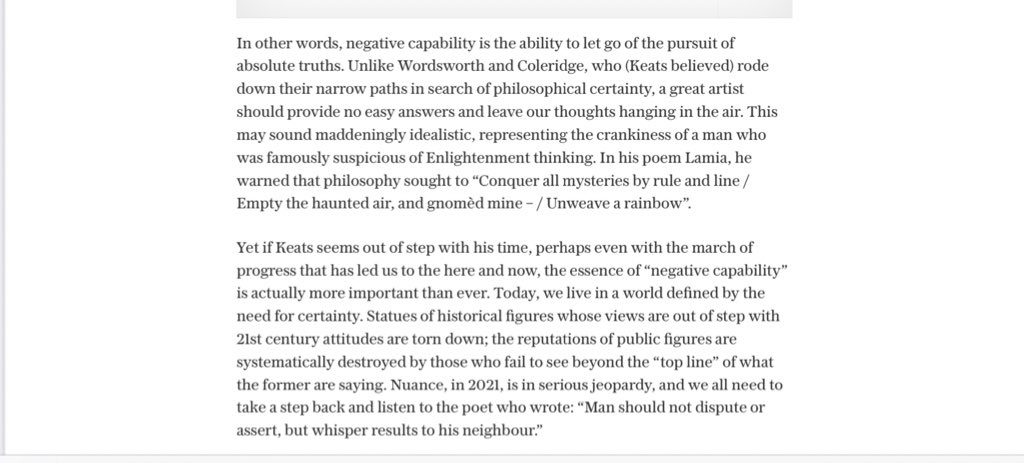Against my own better judgment, I’m thinking about “cancel culture,” because apparently impeachment is no longer allowed—it’s just constitutional canceling...
But also because 2 recent pieces in the Telegraph have used Keats (!) to decry cancel culture!!
This will never do.
But also because 2 recent pieces in the Telegraph have used Keats (!) to decry cancel culture!!
This will never do.
Ok, first I should state the obvious: cancel culture is not actually a thing. Plenty of ink spilled on the topic, but here’s one good recent piece explaining some reasons why all the fear about cancel culture is BS: https://arcdigital.media/theres-no-such-thing-as-cancel-culture-887472db70b2
Let’s take a look at what the first of the two Telegraph pieces has to say. This is ostensibly a review of two new books on Keats, one by Lucasta Miller and one by Jonathan Bate. But the reviewer, Roger Lewis, basically uses the occasion to be an asshole and whine about canceling
I mean, writing more biographies seems a strange way to cancel Keats, but ok!
The real problem that Rog has here: writing about Keats with an eye toward things like colonialism, slavery, gender and sexuality, etc.
Here is a snippet:
The real problem that Rog has here: writing about Keats with an eye toward things like colonialism, slavery, gender and sexuality, etc.
Here is a snippet:
You are telling on yourself if you think Keats didn’t know anything about colonialism. I mean, you don’t even have to be super current on the scholarship! Here is an essay from 1957 about Keats and India: https://www.jstor.org/stable/30210015
Keats was friendly with Charles Lamb, who worked for the East India Company for like 30 years! He met Joseph Ritchie on multiple occasions just before Ritchie led an expedition to North Africa. He read the newspaper, and books! Keats knew plenty about colonialism.
Again, the problem, as this guy sees it, is talking about Keats and any cultural/historical issues that might involve any sort of criticism. But to avoid such things is not just ethically dubious, it’s also not very smart to just ignore things that matter in Keats’ work!
Which brings us to the second piece, published by Ben Lawrence a couple days ago. He argues that Keats should teach us how to accept all viewpoints and “stop finding fault in all things.”
My good dude, trust me—Keats is not on your side. (Nor is Wilde, for that matter)
My good dude, trust me—Keats is not on your side. (Nor is Wilde, for that matter)
Keats loved finding fault in things! Read what he had to say about Wordsworth and Byron. He admired them both but still roasted them! And one reason he found fault in Wordsworth: because the older poet helped campaign for conservative politicians!
But beyond Keats’s political views (there’s no question that they were “on the Liberal side of the question,” as he himself put it), there’s also the absurdity of using negative capability to claim Keats would be against cancel culture.
I know it’s tempting, but it just doesn’t work to use NC to mean whatever you want it to mean. The point here is basically to claim that NC amounts to ignorance. Nope! It is a way of knowing, but one distinct from a particular form Keats associated with his friend Charles Dilke.
And how exactly is uncertainty and a resistance to “irritable reaching” supposed to change how people feel about taking down monuments to Confederate generals and the like?
Keats doesn’t mean we ignore facts and reason—just that we orient ourselves to them in a particular way.
Keats doesn’t mean we ignore facts and reason—just that we orient ourselves to them in a particular way.
Also, NC is an idea about what kind of thinking makes good art. It’s always a bit risky when applying it to other contexts, and especially when the application is done in such a slight, sloppy way as it is here.
One other hilarious thing about the whole idea that NC means never criticizing or finding fault: the first thing Keats does after coining NC is find fault with Coleridge! He literally names this principle and then immediately criticizes someone else in relation to it.
Anyway, the tl;dr version is this: cancel culture isn’t a thing, but even if it were, using Keats to try and decry it would still make no sense.

 Read on Twitter
Read on Twitter




